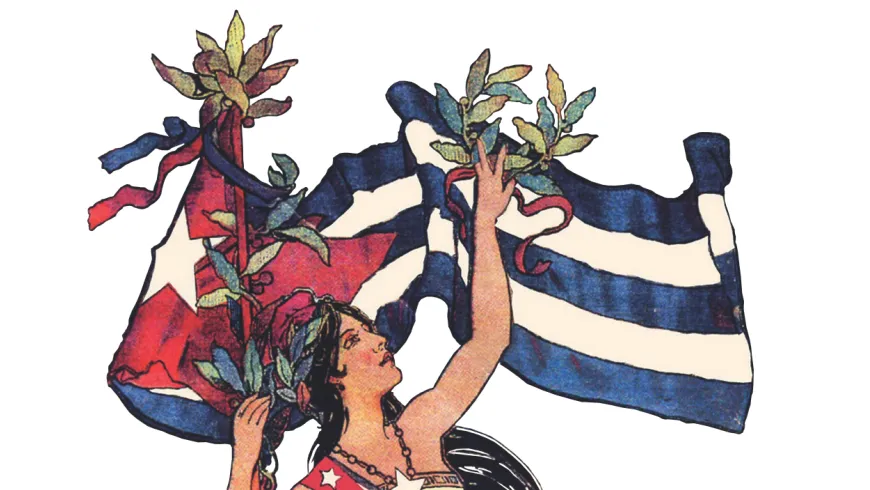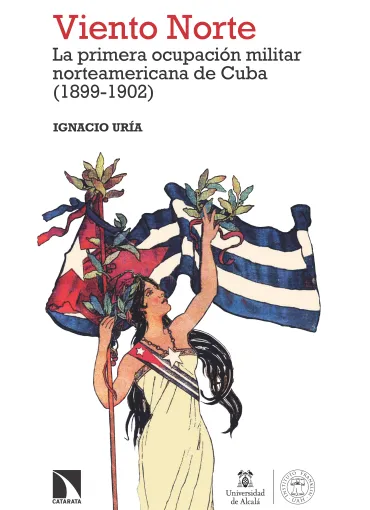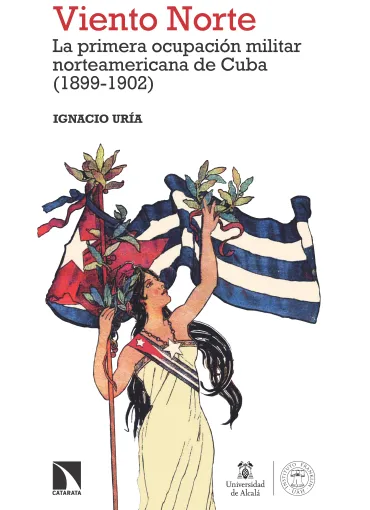Book presentation "Viento norte. La primera ocupación militar norteamericana de Cuba (1899-1902)"
The Instituto Franklin-UAH organizes the presentation of the book Viento norte. La primera ocupación militar norteamericana de Cuba (1899-1902) written by Ignacio Uría. This book, published in 2021, is part of the North American Studies collection that the Institute publishes in collaboration with the publishing house Los Libros de la Catarata.
Date: Wednesday, January 19, 2022
Time: from 7:30pm to 9:30pm
Place: Ernest Lluch Room at Congreso de los Diputados (Madrid)
*access by Carrera de San Jerónimo Street corner with Cedaceros Street
Attendance: free with prior registration using the form available on this website
Institutional Welcome
General Coordinator and Director of External Relations of the Instituto Franklin-UAH.
PhD in North American Studies from the University of Alcalá. M.A. in European Studies from Heriot Watt University in Edinburgh. Degree in Translation and Interpreting from the University of Malaga. She is a professor in the Master's Degree in North American Studies at the University of Alcalá, in the Study Abroad in Spain program, and in the Master's Degree in Teaching at the Instituto Franklin-UAH. Editor of the magazine Tribuna Norteamericana and analyst for the blog Diálogo Atlántico as well as various national and international media. She is also an Alumni of the U.S. Department of State and was part of the Young Leaders Program of the U.S. Embassy. (2014). Her research focuses on American Politics and Spain-U.S. Relations.
Participants
She holds the positions of Secretary of International Affairs of the Partido Popular, Spokesperson for Foreign Affairs of the Popular Parliamentary Group in Congress and Member of the Spanish Delegation to the Parliamentary Assembly of the Council of Europe.
Member of Parliament for Madrid in the X, XI and XII legislatures and for A Coruña in the XIII and XIV legislatures.
Degree in Political Science and Administration from the University of Santiago de Compostela. Master's Degree in European Studies from the Catholic University of Louvain (Belgium). Diploma in Political Studies from the Institut d'Etudes Politiques de Rennes (France). She has completed the Global Competitiveness Leadership Program at Georgetown University (USA) and has been a Fellow at the Weatherhead Center for International Affairs at Harvard University (USA).
She worked in the International Secretariat of the PP for more than 10 years and was later Director of the Cabinet of the Secretary of State for the Presidency in the Government of Mariano Rajoy. She also directed the Euroclima+ Program at FIIAPP. As a Member of Parliament, she has been Spokesperson of the GPP in the International Cooperation Commission and in the Climate Change Commission, as well as Deputy Spokesperson of the Popular Parliamentary Group in the Ecological Transition Commission in Congress.
PhD in History from the University of Deusto (Bilbao) with honors. He is also a European Doctor. In June 2008 his doctoral thesis was awarded the Research Award in the Humanities Area of the Royal Academy of Doctors. He has been a member of the European Team of Excellence in Doctoral Research CLIOHRES (2005-2009); Post-Doctoral Fellow at the Centre for the Study of the Two World Wars at the University of Edinburgh (2009) and Visiting Fellow at Churchill College, University of Cambridge (2014 and 2017). He has been a professor in the Department of International Relations at Comillas Pontifical University since 2009 and its director since 2016. He directs the Comillas Journal of International Relations and collaborates weekly on COPE with a section on history.
Professor of Contemporary History at the University of Alcalá. He is a member of the Cuban Studies Institute (Miami) and has been a professor at the universities of Navarra and Rey Juan Carlos. He did his postdoctoral research at Georgetown University, for which he received in 2011 the International History Award Ateneo Jovellanos with the monograph Iglesia y Revolución en Cuba. From 2012 to 2018, he edited the cultural magazine Nuestro Tiempo and currently collaborates with different national media. He has published five books and two hundred articles of opinion and historical dissemination.
Book Synopsis
The Spanish-Cuban-American War of 1898 ended with the Paris Peace Treaty between the United States and Spain. This agreement meant the end of the Spanish empire in America and the loss of Cuba after four centuries united to the metropolis. The first U.S. military intervention on the island began, a period that would last from 1899 to 1902. In those three years, the U.S. promoted a political and social renovation with the objective of turning Cuba into a loyal ally and, perhaps, to end up annexing it. It also began to control the Cuban economy, particularly the production and trade of sugar, of which it was the world's leading producer. Although the threat of annexation did not disappear throughout the occupation, Cuba was able to declare its independence on May 20, 1902, but it paid a high price: handing over control of its foreign policy to the United States thanks to the Platt Amendment, a clause incorporated into the new Magna Carta. In exchange, it took a big step towards full sovereignty and managed to sign a commercial treaty with the United States that guaranteed a huge and stable market. This book analyzes that brief and fascinating period in which the U.S. became a world power and Cuba laid the republican foundations. A time when democracy arrived from the north like a powerful but also threatening wind.




